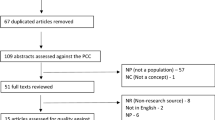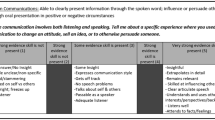Abstract
BACKGROUND: The Accreditation Council for Graduate Medical Education duty hour requirements may affect residents’ understanding and practice of professionalism.
OBJECTIVE: We explored residents’ perceptions about the current teaching and practice of professionalism in residency and the impact of duty hour requirements.
DESIGN: Anonymous cross-sectional survey.
PARTICIPANTS: Internal medicine, neurology, and family practice residents at 3 teaching hospitals (n=312).
MEASUREMENTS: Using Likert scales and open-ended questions, the questionnaire explored the following: residents’ attitudes about the principles of professionalism, the current and their preferred methods for teaching professionalism, barriers or promoters of professionalism, and how implementation of duty hours has affected professionalism.
RESULTS: One hundred and sixty-nine residents (54%) responded. Residents rated most principles of professionalism as highly important to daily practice (91.4%, 95% confidence interval [CI] 90.0 to 92.7) and training (84.7%, 95% CI 83.0 to 86.4), but fewer rated them as highly easy to incorporate into daily practice (62.1%, 95% CI 59.9 to 64.3), particularly conflicts of interest (35.3%, 95% CI 28.0 to 42.7) and self-awareness (32.0%, 95% CI 24.9 to 39.1). Role-modeling was the teaching method most residents preferred. Barriers to practicing profession-alism included time constraints, workload, and difficulties interacting with challenging patients. Promoters included role-modeling by faculty and colleagues and a culture of professionalism. Regarding duty hour limits, residents perceived less time to communicate with patients, continuity of care, and accountability toward their colleagues, but felt that limits improved professionalism by promoting resident well-being and teamwork.
CONCLUSIONS: Residents perceive challenges to incorporating professionalism into their daily practice. The duty hour implementation offers new challenges and opportunities for negotiating the principles of professionalism.
Similar content being viewed by others
References
ABIM Founation. American Board of Internal Medicine, ACP-ASIM Foundation. American College of Physicians-American Society of Internal Medicine, European Federation of Internal Medicine. Medical professionalism in the new millennium: a physician charter. Ann Intern Med. 2002;136:243–6.
Blank L, Kimball HABIM Foundation, ACP Foundation, et al. Medical professionalism in the new millennium: a physician charter 15 months later. Ann Intern Med. 2003;138:839–41.
ACGME. ACGME Outcome Project. Available at: http://www.acgme.org/outcome/comp/compFull.asp#5. Accessed July 14, 2005. Chicago, IL: ACGME; 1999.
ACGME. Resident duty hours and the working environment. Available at: http://www.acgme.org/acWebsite/dutyHours/dh_Lang703.pdf. Accessed July 14, 2005. Chicago, IL: ACGME; 2003.
Larriviere D. Duty hours vs professional ethics: ACGME rules create conflicts. Neurology. 2004;63:E4–5.
Cohen-Gadol AA, Piepgras DG, Krishnamurthy S, Fessler RD. Resident duty hours reform: results of a national survey of the program directors and residents in neurosurgery training programs. Neurosurgery. 2005;56:398. 403; discussion 398–403.
Eggly S, Brennan S, Wiese-Rometsch W. “Once when I was on call...,” theory versus reality in training for professionalism. Acad Med. 2005;80:371–5.
Brownell AK, Cote L. Senior residents’ views on the meaning of professionalism and how they learn about it. Acad Med. 2001;76:734–7.
Miller WL, Crabtree BF. Clinical research: a multimethod typology and qualitative roadmap. In: Miller WL, Crabtree BF, eds. Doing Qualitative Research. 2nd ed. Thousand Oaks, CA: Sage Publications Inc.; 1999:21–3.
Hundert EM, Hafferty F, Christakis D. Characteristics of the informal curriculum and trainees’ ethical choices. Acad Med. 1996;71:624–42.
Hafferty FW. Beyond curriculum reform: confronting medicine’s hidden curriculum. Acad Med. 1998;73:403–7.
Mareiniss DP. Decreasing GME training stress to foster residents’ professionalism. Acad Med. 2004;79:825–31.
Ginsburg S, Regehr G, Hatala R, et al. Context, conflict, and resolution: a new conceptual framework for evaluating professionalism. Acad Med. 2000;75(suppl. 10):S6-S11.
Kellerman SE, Herold J. Physician response to surveys. A review of the literature. Am J Prev Med. 2001;20:61–7.
Author information
Authors and Affiliations
Corresponding author
Additional information
Funding for this project was provided by the Health Resources and Services Administration, Grant #5 D55HP00049-06-00, and the Innovative Curriculum Grant for Graduate Medical Education, Department of Graduate Medical Education, University of Virginia School of Medicine.
Rights and permissions
About this article
Cite this article
Ratanawongsa, N., Bolen, S., Howell, E.E. et al. Residents’ perceptions of professionalism in training and practice: Barriers, promoters, and duty hour requirements. J Gen Intern Med 21, 758–763 (2006). https://doi.org/10.1111/j.1525-1497.2006.00496.x
Received:
Revised:
Accepted:
Issue Date:
DOI: https://doi.org/10.1111/j.1525-1497.2006.00496.x




